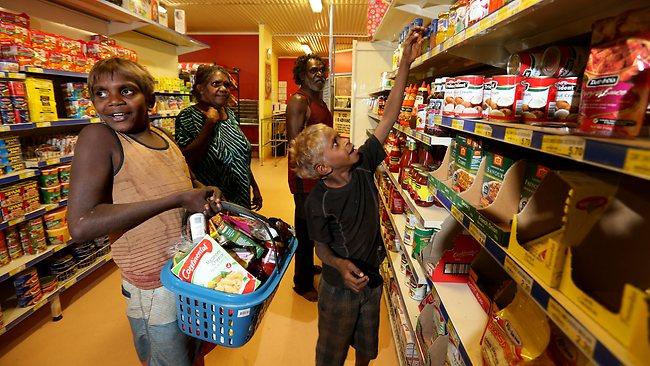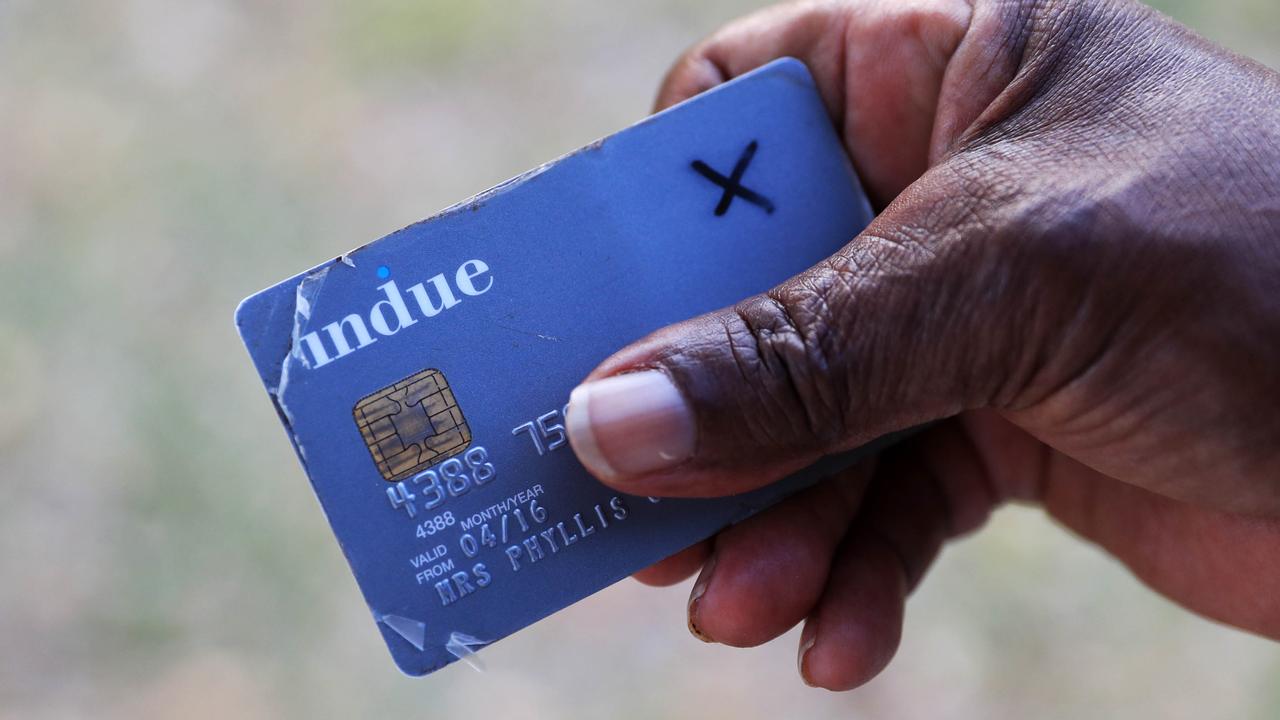As drugs and gambling devour life smart money feeds the APY kids
VOLUNTARY income management benefits a remote SA community.

AT the remote Pipalyatjara store in northern South Australia, a group of Aboriginal women sit on a veranda under corrugated iron, eating microwaved snacks.
They are chatting in their native Pitjantjatjara language, shooing away the flies and the scrawny-looking dogs pawing the dust at their feet.
All are on welfare and most submit to some form of income control. It's either Centrepay, which helps to manage bill payments, or the new BasicsCard, which crossed the border from the Northern Territory last year.
Conversation turns to why so many Anangu women have eagerly taken up the BasicsCard, but not the men.
"The men - they spend all the money on drugs and drink," an older woman says. She speaks quietly while screwing up her nose and putting her thumb to her lips, in the shape of a drug-smoking implement.
"Or gambling," another pipes up. "On Friday night there was big gambling here."
Card gambling rings are a popular pastime for both sexes in the Anangu Pitjantjatjara Yankunytjatjara Lands.
On the previous Friday, $18,000 had been withdrawn from the community ATM, but only $10,000 spent in the store.
The rest was most likely lost in the card game - a variation of 21, in which players bet on cards adding up to 10.
"If it doesn't come back the same day or the next day, we can see how much is leaving the community," store manager Megan Taylor says.
"Sometimes it stays here if someone in the community wins, then the money comes through because the family all have to share it."
But there is a risk that the winnings will find their way to drugs or alcohol in the gritty towns adjacent to the lands, such as Mintabie and Coober Pedy.
Substance abuse remains a big problem in the APY Lands, which cover 100,000sq km of remote northwestern South Australia.
The lands are officially dry, with many residents non-drinkers, but according to the region's women's council, substance abuse involving alcohol and marijuana remains a significant problem.
The council says that there is a lack of data, but it is "most likely" that cannabis use is now a bigger problem than alcohol across the remote communities of central Australia.
Substance abuse in turn feeds other social problems.
Federal government community baseline profiles for APY Lands communities have reported residents' concerns about marijuana use leading to depression, psychosis, suicide, fighting (especially when supplies run out), domestic and family violence and food stealing by hungry, stoned users.
"They rob their mothers, grandmothers for marijuana," one community member says. "There are lots of dealers running around everywhere on the APY Lands."
With a largely welfare-dependent community, money is in short supply, particularly if a lot of it is being spent on addictions.
When money runs out, people turn to relatives for more by way of "humbugging", a term that describes the relentless harassment of family members for money.
This becomes a vicious cycle of substance abuse and domestic violence, with women often subjected to physical abuse if they don't hand over money.
It was this combination of problems that underpinned the push for income management as part of the Northern Territory Emergency Response - the so-called intervention in 2007 - but it remains a divisive policy lever, opposed by many.
The Greens and many public sector unions have mobilised against income management, even after it was modified to comply with the Racial Discrimination Act.
Federal Indigenous Affairs Minister Jenny Macklin is a supporter of income management and has pushed ahead with its introduction in South Australia, despite resistance from Left faction ministers within the state's Labor government.
Since last October, the scheme has been available across the APY Lands on a voluntary basis.
"This government is determined to support vulnerable families so that children get the best chance to grow up healthy and safe," Macklin says.
As at the end of April, 279 people had volunteered for income management across the APY Lands. Of these, 222 are women and 57 men. This represents almost 20 per cent of the area's adult population.
The card works by quarantining 50 per cent of a welfare recipient's income for basic store items, and cannot be used for cigarettes, alcohol or pornography, or accessed as cash.
The government's first evaluation report into income management in the Northern Territory produced variable results but found that the BasicsCard and income management had "helped to protect income management funds from financial harassment and gambling".
For Aborigines on voluntary income management, 59 per cent felt that it had made things better for them and 47 per cent would recommend it to others.
In the APY Lands, there is as yet no analysis of how the scheme is working, but the widespread uptake and anecdotal evidence suggest it has been a welcome tool for families trying to take control of their lives.
Angela Watson, the mother of two young boys, signed up for the card last year, saying it gave her more control over her money and helped her to save for items such as clothes.
"It is good for me to get clothes and food. I want all my money to go on the card," she says.
"The women buy the things, food, clothes, other things for the kids, and I can get the payments and save."
She nods when asked if it has helped with humbugging.
Her husband, Peter, says it makes sense for women to use the BasicsCard, and he also intends to sign up.
"The women buy things more than the men, so it is better for the women," he says.
There does not appear to be any stigma attached to the card, one aspect that has been reported among BasicsCard holders in the Northern Territory.
David Schomburgk, general manager of Mai Wiru, the Aboriginal store co-operative that runs eight outlets on the APY Lands, says there is positive feedback about the scheme.
"The BasicsCard is working, it has been a good thing," he says.
"People are using it and seem very comfortable with it and the feedback we have got back has been positive.
"Some people have asked us if they can put everything on it."
Taylor, whose Mai Wiru-owned store is one of the most isolated on the APY Lands, is opposed to compulsory income management but says the BasicsCard has made a big difference to many people in the community.
"It is more easily controlled by the customer, so they have control of the card and none of their family can take it," she says.
"The whole concept of quarantining is fantastic."
In many APY communities, there are still children going hungry.
Andrea Mason, from the women's council, who has been a strong advocate of voluntary income management, says women are trying to reclaim financial control to ensure their children receive the basics.
"People are being very positive about it and there has been a big uptake," she says.
"When we asked about the model, women were overwhelmingly saying, 'Let's get this happening in the communities and have the option of people signing up voluntarily.'
"When children are missing out on food and when money is being spent on alcohol and drugs ... women are saying, 'Enough is enough and we need to be able to take financial control.' "
The women's council also has lobbied to extend the option of voluntary income management to wage earners in remote communities, to ensure humbugging does not act as a disincentive.
So far the federal government has resisted this call, maintaining it is up to employers to make arrangements with their workers in those instances.
For now, South Australia is also without the more controversial aspects of income management, including mandatory referrals for vulnerable individuals.
This is expected to be rolled out once the South Australian government finalises its processes for referral, something it has committed to do this year.
A recent food report for the APY Lands shows there is still work to be done to improve food security in the area, with the APY authority still spending tens of thousands of dollars on "emergency food" every year.
Uniting Communities indigenous policy expert Jonathan Nicholls says the introduction of income management has been good for the welfare of Aborigines, but more needs to be done to address the affordability of food in remote stores.
"The speed with which many Anangu, particularly women, have taken to income management should leave governments in no doubt that many people on the APY Lands want to be sure that money they have is available for food and other essential items," he says.
"Affordability is the next and as yet unaddressed food security challenge and, until that's addressed, exorbitant prices will limit the positive impact of income management."


